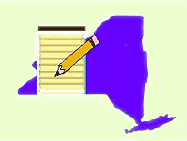 Hey WNYWP Fellows. Last night I said that I would profile a few edubloggers over the course of the next few weeks in order to help everyone get a sense of the evolving conversations that characterize good blogs. David Warlick is a blogger I have been reading for about a year now. He focuses on literacy, Web 2.0, and a host of questions and educational issues. His blog, 2 Cents is his hub for these discussions.
Hey WNYWP Fellows. Last night I said that I would profile a few edubloggers over the course of the next few weeks in order to help everyone get a sense of the evolving conversations that characterize good blogs. David Warlick is a blogger I have been reading for about a year now. He focuses on literacy, Web 2.0, and a host of questions and educational issues. His blog, 2 Cents is his hub for these discussions.He's a good place to start. When I'm home I'll post a snippet of one of his latest posts. This post is about developing 21st Century Literacy amongst educators. It's a great read and lists some salient posts. I'd link right now, but for some reason this site is blocked by BOCES censorbots (which in itself is ridiculous, as the site had to be manually added manually as it is a unique URL, which makes me question why an educational TIS person would want to block the thoughts of a prominent Ed Tech persons. There is some sort of irony there...or maybe an agenda...not sure which. Maybe both.)

Okay, now I'm home. Here's a snippet from Warlick's 3rd most recent post titled "A Pat to Becoming a Literate Educator." Interesting list.
So, I tell them to do what I’ve done — read blogs. Find some people who are talking about what you want to learn, and from them, you’ll learn of others with ideas and practices to share.
Path to Becoming a 21st Century Literate Educator — Self Development
- Find two or more other educators in your school who are interested in learning and using emerging information and communication technologies. It would be of enormous advantage if you can include your schools library media specialist.
- Identify the appropriate person in your school or district who can provide technical support and configuration for your increasingly utilized computers and network. Bake them some chocolate chip cookies.
- Identify some edu-bloggers who are talking about the emerging ICTs you are considering. See the Bloggers to Learn From wiki, contributed to by a world community of educators.
- Delegate! Assign each member of your team some of the selected blogs to follow, and share specific posts with each other.
- Read, study, and discuss books about teaching and learning and the world we’re doing it in. See the Books to Learn From. wiki, contributed to by a world community of educators.
- Schedule regular meetings (once or twice a month) at a local restaurant, coffee shop, or pizzeria (preferably with WiFi). Meet and discuss what you’ve learned and what you want to learn.
- Start a group del.icio.us (A social bookmarks service) account for organizing and sharing web resources.
- Start a wiki for posting notes, links, and step-by-step instructions.
- Join one or more of the Ning social networks, such as: School 2.0, Library 2.0, Classroom 2.0.
- Start your own blogs for sharing your reflections on what you are learning and how you are learning it.
- Start experimenting in your class and share the results.
- Share your results with other teachers in your school and Invite them into your conversation.
Start to model, in your job as a teacher, the practice of being a master learner.
* * * * * *
On a somewhat unrelated note, I tried to access my Google Docs account at the end of the school day only to find it blocked by BOCES. This site, as well as Google Calendar were blocked and categorized as "Web Productivity Apps." I am unsure what kind of reality we are living in, but when do we ever want to prevent students and teachers from being more productive? How can we teach kids to collaborate and make decisions when people in guarded towers bar the tools? It makes me want to pull my hair out. Anyways, comments?- Joel






1 comment:
Thank you for this post. I'm going to use it in my Teaching for Literacy course.
Post a Comment